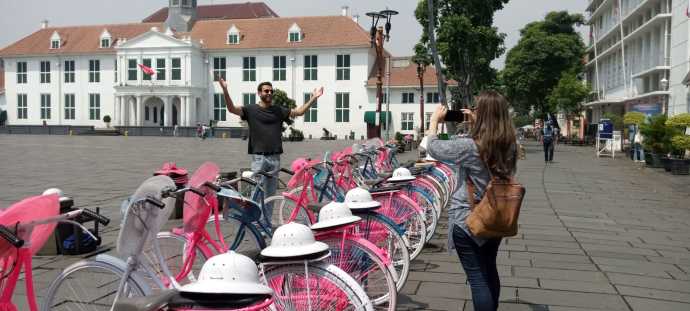Set on learning about potential collaborations, an Israeli delegation of investors, tech professionals and trade officials visited Indonesia last month.
The delegation explored potential investments, start-up ventures and social impact initiatives with their counterparts in Indonesia, the most populous Muslim-majority country and fourth-largest country in the world.
The country does not have diplomatic relations with Israel, which meant the delegation had to travel with non-Israeli passports.
The trip was organized by the Israel-Asia Center and ran July 17-22. It was accompanied by a three-month online program also run by the Center, attended by nearly 100 Israelis and Indonesians.
The Center’s founder and executive director Rebecca Zeffert noted that despite the lack of diplomatic relations, there is still “tremendous untapped potential in education, fintech, cybersecurity, AI, mobility, healthcare, agritech and water technologies.”
According to the Center, Israel-Indonesia trade comes to about $500 million per year. By 2030, Indonesia is expected to have the world’s fifth-largest economy. Furthermore, Indonesia’s internet economy is growing by 49% a year and will reach $330 billion in the next eight years.
“When you take all of this into account, it’s not surprising that Indonesia’s digital economy is experiencing massive growth, particularly post-COVID,” Zeffert continued.
The Israeli delegation to Indonesia
The in-person delegation, which included meeting with Indonesian business leaders, university presidents, entrepreneurs and investors, in addition to visits to local start-up hubs, historical sites in Jakarta, and a visit to one of its kampung (slums), expanded on the virtual program.
“The online program is an opportunity for participants from both sides to dip their toe in the water,” Zeffert said. “However, this trip took these relationships to a whole new level.”
“The online program is an opportunity for participants from both sides to dip their toe in the water, however, this trip took these relationships to a whole new level.”
Rebecca Zeffert
Attendee Avraham Lifshitz, an Orthodox Jew who said throughout the trip he wore a hat over his kippah in public out of caution, said he was struck by the warmth and openness of Indonesians.
“In private, being overtly Jewish wasn’t a hindrance to interacting with Indonesians, it was an object of curiosity,” said Lifshitz, who was in Indonesia for his first time.
“Their questions came from a place of genuine curiosity and left me hopeful that people-to-people connections will serve as the future foundations for bridges between Israel and Indonesia,” Lifshitz, a consultant to Abu Dhabi-based DANA Venture Builder, which supports women-led start-ups in desert tech, continued.


